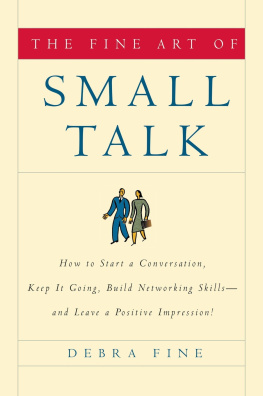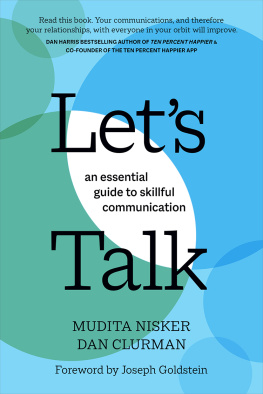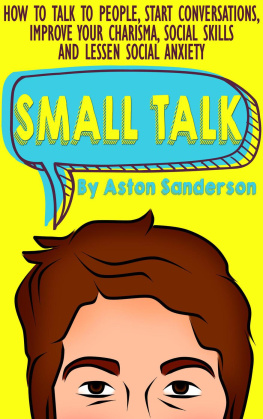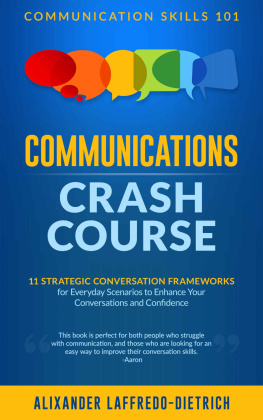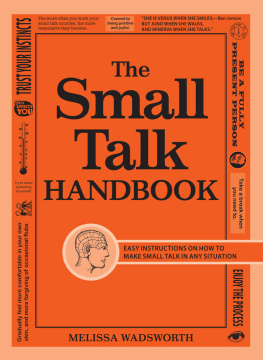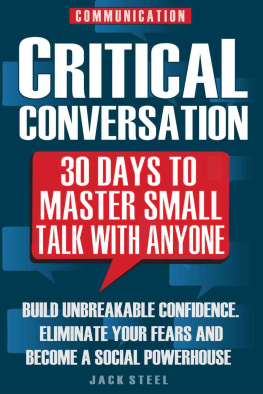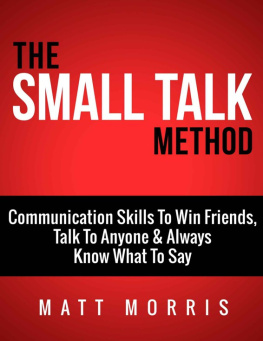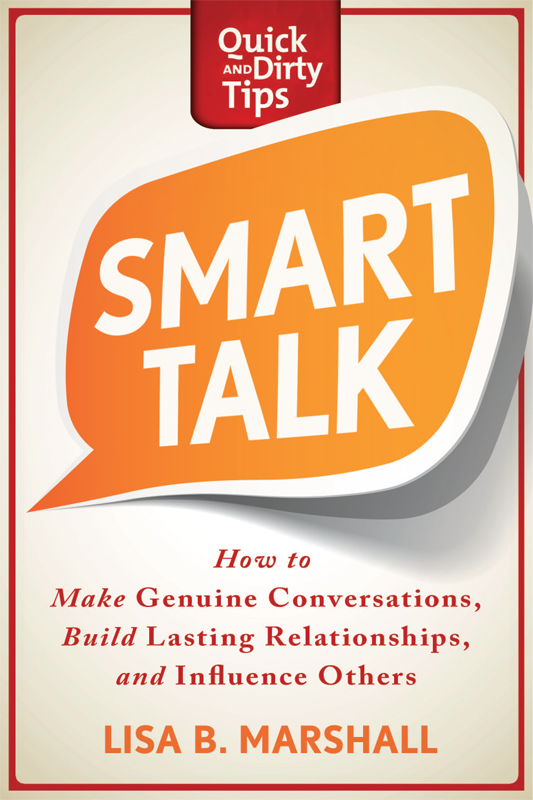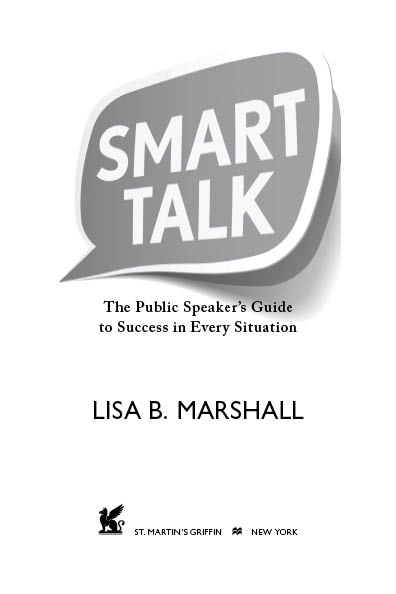
The author and publisher have provided this e-book to you for your personal use only. You may not make this e-book publicly available in any way. Copyright infringement is against the law. If you believe the copy of this e-book you are reading infringes on the authors copyright, please notify the publisher at: us.macmillanusa.com/piracy.
Armando, Ariana, Daniela,
John, Mom, and Dad.
And to your success!
Acknowledgments
Thanks first to my husband, Armando, and my children, Daniela and Ariana. I smile when I think of all the love and support I receive from you daily. Girls, I wrote this book for you so that you will know what I didnt know! You were my inspiration. Even if you are the only two people who read and benefit from this book, Ill know my efforts were worth it! I love you with all my heart.
I want to thank my two best friends who have supported me throughout my life: Linda Remington and Larissa Whitman. It is a rarity to have friends like you and I am privileged to have you in my life.
The ones who made everything possible were Grammar Girl (aka Mignon Fogarty) and the rest of the Quick and Dirty Tips team at Macmillan. Id like to especially thank Beata Santora for her excellent editing. This book is so much better because of you. Thanks!
Thanks to my professors who helped me to complete my masters degree in organizational and interpersonal communication: Donald Cushman, Michael Huspek, and Sara Cobb.
Thanks to my clients who trusted me and urged me to expand my programs over the years.
Thanks to the Lisa B. Marshall support team: Lou Crocetto, Sherri Barksdale, Michelle OShea, Tim Roufa, Whitney Punchak, and Mallory Rhodes. I appreciate all of your contributions.
Id like to thank the beta readers for their insights, recommendations, and encouragement: Linda Remington, Ken Flowe, Deborah Spivack, Christopher Incao, Bill Jackman, Glen Munro, Tatenda Mupini, Cristopher G. Johnson, Brian Schardt, Bill Jackman, Alison Scheid, Sarmi Gilani, Reeteka Sud, Taha Arbaoui, Cindy Labaz, Reece Sellin, Fernando Marono, Bonnie Wong, Whitney Bishop, Mr. & Mrs. Laura Baboolal, and Stephanie Kiernan.
Without the support of The Public Speaker community, this book wouldnt have been possible. Thanks to all the listeners, readers, and fans of The Public Speaker podcast who have supported me, especially Marie-Adele Guicharnaud, Piper Hendricks, Syed Quadri, Chris Woodhouse, Dan Murrell, Brian Mattocks, Bob Levy, Terry D. Kozlyk, Jeff Hurt, Connie Malamed, Jeremy Goh, Kris Harty, and Artem Daniliants.
Special thanks to Dr. Robert Cialdini, Trisha Liu, Angela Lauria, Mac Smith, Kathleen Walker, David McGuire, Ali Brown, Barrett Peterson, Steve and Jennifer Chou, Rabbi Eli Adler, Dr. Ken Flowe, and Beth Beutler.
To my brothers and sisters: Deb Boehm-Davis, Ron Boehm, Rich Boehm, and Maria Watson; and to Grandma Vincenza and Grandma Ita. Love to you all.
I miss you, Mom, Dad, and John.
Contents
Youre Invited!
Take the Smart Talk Success Quiz!
Are you Smart Talk successful?
Visit www.smarttalksuccess.com/quiz to learn your Smart Talk Success score. When youve finished the book, go back and take the quiz again. Compare your scores to measure how much youve learned!
Introduction:
The (Not So) Hidden Cost of Saying the Wrong Thing
You teach best what you most need to learn.
R ICHARD B ACH, I LLUSIONS: T HE A DVENTURES OF A R ELUCTANT M ESSIAH
Have you ever been surprised to find out you werent as good or as smart as you thought? Ill always remember the day I was called into Bob Goodmans office. He was a very senior manager and I was just a young management trainee at General Electric. I could feel my stomach doing flip-flops as I apprehensively entered his office. After some small talk he told me something I have never forgotten. He said:
Lisa, you are like a big ship, like a cruise liner, coming into port. You rock all of the other small ships and you dont even realize it. Wed like to help you with that. We want to send you to some training.
It turns out GE wanted to send me to a training course to improve my interpersonal communication skills. I was mortified!
Obviously, at that time, I didnt know what I didnt know.
Were taught reading and writing in school, yet rarely (if ever), are we taught to be smart about what we say and how we say it. We arent taught communication skills.
For example:
Do you know specific methods of introducing yourself that will form positive first impressions and lead to strong relationships (and the ways an introduction can limit your chances of ever building a relationship)?
Do you know all the specific ways to shake hands that instill confidence and trustworthiness (and the common mistakes that many people make)?
Do you know how to move beyond initial conversations? Beyond collecting friends or fans, to sincerely and effectively engage with people and create significant, meaningful relationships?
Do you know what to say when someone is going through a difficult time?
Do you know how to deliver effective feedback without using the old sandwich approachwhich, by the way, doesnt work?
Do you know how to respond to criticism?
Do you know alternative ways to say no yet still develop and build a relationship?
Do you know how to respond with diplomacy, tact, and grace?
Do you know how to deliver difficult news or how to handle a difficult conversation?
Do you know what to say when dealing with a bully, a whiner, or any other difficult person?
Do you know what makes a master negotiator different from a novice negotiator?
Do you know what to say to effectively persuade and influence others?
Do you know how our brains are wired to cause attraction, likability, and trustworthiness?
Too often, the answer to all of these questions is no. Or worse, we have some vague notions that trick us into thinking that we know the answers. And we realize that we really dont know what to say only when we have a problem after weve significantly damaged a relationship.
That leads me to the rest of my story
The man sitting next to me at the communication skills training seemed very unhappya curmudgeon. He explained that he worked for the post office and that every year there is a communication skills survey among the employees and the managers who score the lowest are forced to come to this course. Charm school he called it.
At the training, our first task was to take an inventory of our communication style, adding up points for different measures. After hearing his story, I couldnt help myself. I was dying to see the scores for this rough-edged guy from the post office, so I peeked over to see his scores.
What I noticed immediately was that our scores for each and every category were exactly the same! (I even double-checked and triple checked his scores against mine. Its a moment in my life Ive never forgotten.)
I was stunned.
It was then that I realized I needed to change. I promised myself that I would commit myself to practicing and improving my communication skills. I promised that I would polish my people skills. I promised that I would learn as much as I could to become smart about communication. That was just the very beginning of my journey.
I learned a lot in the next twenty-five years.
Finding My Passion
After finishing the initial two-year management training program at GE, I was asked to join GEs corporate audit staff, an accelerated leadership development program. That was when I first noticed that the root cause of many organization issues stemmed from problems in communication. (Interestingly, much later, in 2009, I read a small study that reported that the cost of poor communication was approximately $35,500 per worker per year.)


